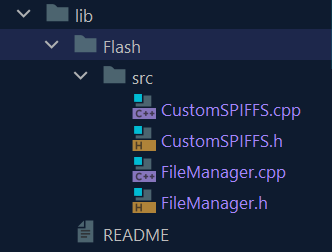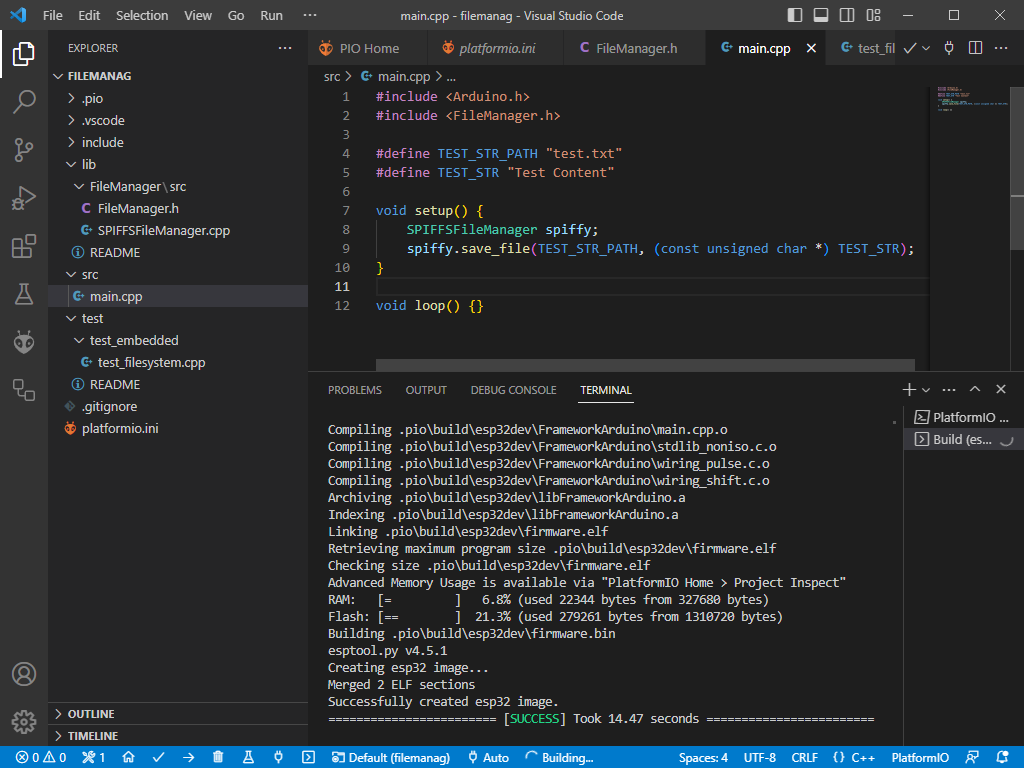I am getting an undefined refference on the deconstructor and exists method of my SPIFFSFileManager object.
MY_USER_PATH/test/test_FileManager/SpiffsManager_tests.cpp:112: undefined reference to SPIFFSFileManager::SPIFFSFileManager()
MY_USER_PATH/test_FileManager/SpiffsManager_tests.cpp:13: undefined reference to `SPIFFSFileManager::~SPIFFSFileManager()'
My header file containing the forward decleration:
//
// Created by DripTooHard on 14-04-2023.
//
#ifndef FAGPROJEKTLORA2023_FILEMANAGER_H
#define FAGPROJEKTLORA2023_FILEMANAGER_H
#include "SPIFFS.h"
class FileManager;
class SPIFFSFileManager{
private:
fs::SPIFFSFS * fileSystem;
public:
SPIFFSFileManager();
~SPIFFSFileManager();
/**
* Saves a file to the flash using SPIFFs
*
* \return true if a success, false if a failure, prints a custom error message
*/
bool save_file(const char * filePath, const unsigned char * dataToWrite);
bool exists(const char * filePath);
bool delete_file(const char * filePath);
bool load_file(const char * filePath, unsigned char * resultArray);
};
#endif //FAGPROJEKTLORA2023_FILEMANAGER_H
My implementation:
//
// Created by DripTooHard on 14-04-2023.
//
#include "FileManager.h"
class FileManager{
public:
FileManager(){}
virtual ~FileManager(){}
virtual bool save_file(const char * filePath, const unsigned char * dataToWrite) = 0;
virtual bool load_file(const char * filePath, unsigned char * resultArray) = 0;
virtual bool delete_file(const char * filePath) = 0;
virtual bool exists(const char * filePath) = 0;
};
/**
* Whenever we deconstruct the SPIFFSFileManager, we unmount the SPIFFs module.
*/
SPIFFSFileManager::SPIFFSFileManager()
{
//We have to mount the spiffs
SPIFFS.begin(true);
}
SPIFFSFileManager::~SPIFFSFileManager(){
}
bool SPIFFSFileManager::save_file(const char *filePath, const unsigned char *dataToWrite) {
Serial.printf("Writing file: %s\r\n", filePath);
File file = fileSystem->open((const char *)filePath, FILE_WRITE);
//Failed to open
if(!file){
Serial.println("− failed to open file for writing");
return false;
}
//Written succesfully
if(file.print( (const char *) dataToWrite)){
Serial.println("− file written");
return true;
//Failed to write
}else {
Serial.println("− frite failed");
return false;
}
}
bool SPIFFSFileManager::exists(const char *filePath) {
return fileSystem->exists((const char *) filePath);
}
bool SPIFFSFileManager::delete_file(const char * filePath){
Serial.printf("Deleting file: %s\r\n", filePath);
if(fileSystem->remove((const char *)filePath)){
Serial.println("− file deleted");
return true;
} else {
Serial.println("− delete failed");
return false;
}
}
bool SPIFFSFileManager::load_file(const char * filePath, unsigned char * resultArray){
File f1 = SPIFFS.open(filePath);
if(!f1 || f1.isDirectory()){
Serial.println("− failed to open file for reading");
return false;
}
int i = 0;
unsigned char res;
while(f1.available()){
res = f1.read();
resultArray[i++] = res;
}
return true;
}
And the SpiffsManager_test.cpp
//
// Created by DripTooHard on 20-05-2023.
//
#include <Arduino.h>
#include <unity.h>
#include "Utility.cpp"
#include "Flash/FileManager.h"
#include "esp_system.h"
const char * TEST_STR_PATH;
char * TEST_STR;
SPIFFSFileManager spiffy;
int testInt;
bool didWeRestart(){
return esp_reset_reason() == ESP_RST_SW;
}
void setUp(void) {
// set stuff up here
TEST_STR_PATH = "abc";
TEST_STR = "ABC";
}
void tearDown(void) {
// delete stuff down here
testInt = 3;
}
/**
* Scenarie:
* ABCDEF eksisterer ikke, vi gemmer det og genstarter ESP'en
* ABCDEF eksisterer nu, vi kan loade det
* Vi sletter ABCDEF, det eksisterer ikke
*
*/
void dataIsSavedAfterReboot(){
//Before the reset we save it, and assert that we have indeed saved it
if(!didWeRestart()){
TEST_ASSERT_FALSE(spiffy.exists(TEST_STR_PATH));
spiffy.save_file(TEST_STR_PATH,(const unsigned char *) TEST_STR);
TEST_ASSERT_TRUE(spiffy.exists(TEST_STR_PATH));
}
//After the reset we check to see if it still exists, if we can load it, we then delete it
else{
TEST_ASSERT_TRUE(spiffy.exists(TEST_STR_PATH));
unsigned char * load_result_arr;
spiffy.load_file(TEST_STR_PATH,load_result_arr);
//Time to delete it
TEST_ASSERT_EQUAL_STRING(TEST_STR,load_result_arr);
spiffy.delete_file(TEST_STR_PATH);
TEST_ASSERT_FALSE(spiffy.exists(TEST_STR_PATH));
}
}
/**
* Scenarie: Vi gemmer noget, det eksisterer, vi sletter det, det eksisterer ikke
*
*/
/**
* Scenarie: Vi gemmer ABCDEF, vi loader det i et array og får ABCDEF
*
*/
/**
* Scenarie: Vi gemmer ABCDEF, genstarter ESP32'eren, og vi kan loade det og det eksisterer,
*
*/
/**
* Scenarie: Vi laver to SPIFFS objekter på samme tid
* Der eksisterer Spiffs objekt 1, der eksisterer spiffs objekt 2, vi bruger spiffs objekt 1 til at gemme ABCDF, vi bruger spiffs objekt 2 til at loade ABCDF
* ABCDF er nu i arrayet, som vi har brugt til at loade
* Vi genstarter ESP32'eren
* Vi laver et Spiffs objekt 3, vi loader ABCDF, ABCDF er nu i arrayet
*/
/**
* Scenarie: Vi laver, sletter, laver
* Givet laver spiffs2
* Og sletter spiffs2
* Og laver spiffs 1
* Så bør spiffs1 være mounted
*/
/**
* Scenarie: Vi laver, vi laver, vi sletter
* Givet laver spiffs2
* Og laver spiffs 1
* Og sletter spiffs 2
* Og vi prøver at gemme "ABCDF" i path "EKG"
* Så bør vi kunne loade "EKG" vhja. Spiffs1
*/
void setup()
{
delay(5000); // service delay
//DON'T PUT ANYTHING BEFORE THIS EXCEPT FOR DELAY!!!!
UNITY_BEGIN(); //Define stuff after this
RUN_TEST(dataIsSavedAfterReboot);
if(!didWeRestart()){
esp_restart();
}
UNITY_END(); // stop unit testing
}
void loop()
{
}

